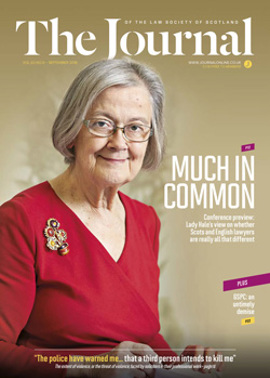Good enough reason?

Reponing notes
In a number of decisions recently it would appear that courts have cast a more critical eye over the reasons provided in reponing notes as to why appearance was not entered timeously. Sheriff Principal Pyle in the decision of the Sheriff Appeal Court in Byres v Moore [2018] SAC (Civ) 17 (29 June 2018) referred again to the Inner House decision in Forbes v Johnstone 1995 SC 220. He observed that that decision indicated that if there appeared to be a statable defence disclosed in the reponing note and an explanation of some kind was provided for appearance not being entered, the note required to be granted. He noted that their Lordships did however observe that it was a matter of discretion, entitling the sheriff to take account of all the circumstances and to balance one against the other in coming to the decision of whether to grant or refuse the note.
However, a subsequent decision of the Inner House in Thompson v Jardine 2004 SC 590 indicated that the nature of the reason for failing to appear still required to be considered. Sheriff Principal Pyle in allowing the appeal observed that the decision of the full bench in the former case indicated that factors such as the defence relating only to quantum, the fault lying with significant insurers who regularly deal with claims, and the desirability of efficient and effective case management in litigation did not trump the decision in Forbes v Johnstone. Bearing in mind that that decision is a full bench decision from the Inner House and a decision from the Sheriff Appeal Court is binding authority throughout Scotland for sheriff court litigation, it would appear that if there is a statable defence contained in the reponing note, very little will be required in the way of an explanation to enable a reponing note to be granted.
Case management
This was and is the hot topic. I simply refer readers to certain observations from the Lords Ordinary in Gibson v Babcock International Ltd [2018] CSOH 78 (25 July 2018) at paras 107-112 and Barr v Cassels [2018] CSOH 79 (25 July 2018) at paras 126-127. The observations relate to the instruction of an expert witness and written pleadings. The fact that a court is being encouraged to take a more proactive role under the heading of case management does not relieve parties from what they should be undertaking. In short, it is primarily the litigant’s case, not the court’s! The court’s involvement is to attempt to ensure that a litigation proceeds through a court reasonably efficiently in all the circumstances. However, it is the litigant who should have the complete knowledge of what is involved and required.
Evidential issues
The importance of instructing the right skilled witness was highlighted in the decision of Sheriff Braid in Norgate v Britannia Hotels Ltd [2018] SC EDIN 46 (7 August 2018). A guest at a hotel was injured on stairs. A skilled witness employed by the pursuer had been previously employed by the Health & Safety Executive, but his experience was in the employment context as opposed to assessing the responsibilities falling upon an occupier. He thus attempted to import standards of care in employment situations into the duties incumbent on an occupier. In addition, the language of his report was that of persuasion and advocacy as opposed to that of an independent expert. In those circumstances much of his evidence was ruled inadmissible.
In addition, the remaining evidence was rejected.
Another point raised in the decision was the operation of s 2 of the Civil Evidence (Scotland) Act 1988. Sheriff Braid considered that the provision focused on the character of the evidence in question as opposed to the competency of the maker of the statement. Accordingly, it was not a precondition of the admissibility of the statement that the maker of the statement was identified and thus their competency as a witness determined.
Sanction for skilled witnesses
There are a number of useful observations on this issue in Sheriff McGowan’s decision in Keddie v Cltiybc [2018] SC EDIN 41 (28 June 2018). Certification is a matter of judgment, not discretion. There is no exhaustive list of factors to be considered. One purpose of the rule relating to certification is to regulate the cost of litigation; reasonableness is determined objectively at the time of instruction, which will depend on the state of affairs at that time. Reasonableness requires proportionality between the decision to instruct a skilled witness at the time and the matters at issue or likely to be at issue. Such matters as the issues between the parties, the nature of the injury suffered, how long has passed since the date the injury was sustained, what is the apparent level of recovery, is there likely to be a full recovery, will there be sequelae and if so the nature and duration, has there been an absence from work and if there has, what has been the duration?
Consideration of these matters does not involve a slavish adoption of a determined procedure. Accordingly in the case in question, the apparent low value of the claim, the fact that it appeared the injury was straightforward, and there was no indication as to the reason for instruction of the particular expert, resulted in the refusal to certify the employment of a consultant.
Appeals
There is a useful aide-memoire provided by Sheriff Ross in the decision of the Sheriff Appeal Court in Vehicle Control Services Ltd v Laird [2018] SAC (Civ) 18 (12 July 2018), an appeal directed at issues of sufficiency of evidence, that the test for sufficiency is low. Once the evidential burden is satisfied, the onus falls on the opponent to challenge that by leading evidence, by submission, or by advancing competing inferences.
Defective citation
In Tarmac Trading Ltd v Hamilton [2018] CSIH 46 (4 July 2018) the Inner House determined that failure by an English process server to sign a form 13.7 citation could be relieved by the exercise of the dispensing power set out in RCS, rule 2.1.
Party litigants
In Aslam v Royal Bank of Scotland [2018] CSIH 47 (27 June 2018) the Inner House refused to grant permission to appeal a decision of the Sheriff Appeal Court to the Inner House. The reasons are really neither here nor there as they are case specific. Lady Paton again emphasised that party litigants and Mackenzie friends required to comply with the rules of court and court administration in the same manner as any other person. To provide such persons with special indulgence would result in the court system becoming unfair.
Actions of reduction
In Carr v R H Independent Healthcare Ltd [2018] CSOH 82 (3 August 2018) the issue was the effect of a decree in an action of reduction. A decree in an action of personal injury had been reduced. Lord Brailsford determined that although an extract decree had been granted in the action, that did not result in the court being functus. The issue of an extract simply evidenced the granting of a final decree. If that decree was overcome by a subsequent judicial act such as a decree in an action of reduction, the action for damages for personal injury remained extant.
Update
Since the last article, Shanley v Clydesdale Bank plc (July article) has been reported at 2018 SLT 572, Grubb v Finlay (May) at 2018 SLT 463, PS v NS (July) at 2018 SLT (Sh Ct) 223, Kidd v Paull & Williamsons LLP (November 2017) at 2018 SCLR 278, and Russell v Russell (November 2017) at 2018 SCLR 285.
In this issue
- Confidence restored: internal investigations and legal privilege
- Court reforms: still an unknown quantity
- Ruled out of court?
- Uncovering the environment (1)
- Medical death: a case to answer
- Reading for pleasure
- Opinion: Kerry Trewern and Rhona McNair
- Book reviews
- Profile: Ryan McCuaig
- President's column
- Developing digital services
- People on the move
- Leading judgment
- Health check
- Open to attack
- Claims: beating the trigger
- Storage: time for digital
- GSPC: eulogy for a friend
- Relevant persons: a challenge
- New specialist land registration practice launches
- Good enough reason?
- Copyright: underpinning control
- Writing means writing
- Rent moves: two crucial hoops
- Debtor wins in policy decision
- Scottish Solicitors' Discipline Tribunal
- KIR: the time bomb explodes
- The guideline goal
- GC NextGen: a network for you?
- Your Law Society of Scotland Council members
- Public policy highlights
- Double boost for Society's AML team
- Ask Ash
- Practice rights and the impact of Brexit: working in the EU
- Acting as notary: what do I need to know?
- Engagement letters: a practical approach
- Uncovering the environment
- Paralegal pointers






